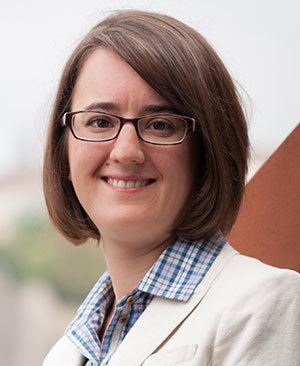 Therese Cory
Therese Cory
What if the way we think we relate to the world around us is wrong?
Therese Cory, an assistant professor in Notre Dame’s Department of Philosophy, is analyzing theories crafted hundreds of years ago about how people interact with their surroundings. She wants to understand more about the original theories and whether they’ve been interpreted correctly over time.
Specifically, she’s studying 13th-century philosopher Thomas Aquinas.
Aquinas developed theories about how people acquire understanding of objects around them by interacting with those objects—anything from trees to chairs. One of the most important features of his theory is also one of the most puzzling—namely, he claims that the intellect becomes what it knows.
Cory argues that this claim has been persistently misunderstood by readers of Aquinas, who take him to be describing some mysterious way in which the intellect unites with the trees and chairs outside itself.
She believes that instead, Aquinas is describing the kinds of changes that happen within the mind when it encounters new things.
“When I know a tree, I become internally ‘tree-ified,’” Cory said. “Knowing, in short, is a kind of inner transformation, in which our minds acquire new levels of reality that we did not previously have.”
Recently, Cory wrote an essay based on her research that won the American Catholic Philosophical Association’s Rising Scholar Award. The group published Cory’s essay, “Knowing as Being? A Metaphysical Reading of the Identity of Intellect and Intelligibles in Aquinas,” in its journal and awarded her a cash prize and a one-year membership to the organization.
The Rising Scholar Award is not the first accolade Cory has received for her research on Aquinas. Her book Aquinas and Human Self-Knowledge (Cambridge University Press) won the Circolo San Tommaso D’Aqino’s 2014 Veritas et Amor international contest for best thesis or monograph on the thought of Thomas Aquinas by a younger scholar.
She also won the 2015 Journal of the History of Philosophy best article prize for “Rethinking Abstractionism: Aquinas’s Intellectual Light and Some Arabic Sources.”
Often there’s a sentiment that an 800-year-old thinker’s theories have been analyzed to death, but there’s still much to uncover about Aquinas, Cory said.
“I hope people will read the article and think he has fresh and innovative things to say to us today,” she said.
Cory’s essay on Aquinas is part of a larger study looking at how the mind operates, and she’s now working on a book about the topic. Ultimately, she’s interested in researching more about what earlier Arab thinkers thought about how the mind draws information from different sources.
“I’ve been really interested in philosophical problems about the human consciousness and knowing for some time,” she said.
“When I know a tree, I become internally ‘tree-ified.’ Knowing, in short, is a kind of inner transformation, in which our minds acquire new levels of reality that we did not previously have.”


